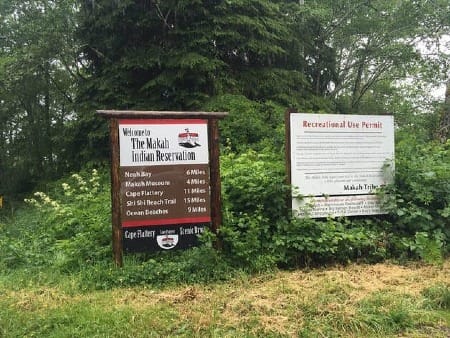Facing "Existential Threats" From Climate Change, Two Indian Tribes Sue Big Oil

A pair of Indian Tribes in the US Pacific Northwest are taking major oil and gas companies to court over climate-related damage and alleged deception.
On Wednesday, December 20 the Makah Indian Tribe and the Shoalwater Bay Indian Tribe each filed climate lawsuits in King County Superior Court in Washington State against some of the largest petroleum producers on the planet, demanding they help pay for escalating costs of responding and adapting to the climate crisis. Like other climate suits filed by local jurisdictions in the US against the fossil fuel industry, the Tribes’ cases say the rising damage costs stem from a decades-long campaign of corporate deception that effectively sustained society’s reliance on fossil fuels and delayed meaningful climate policies.
“Defendants mounted a disinformation campaign beginning as early as the 1970s to discredit the burgeoning
scientific consensus on climate change; deny their own knowledge of climate change-related threats; create doubt about the reality and consequences of the impacts of burning fossil fuels; and delay the necessary transition to a lower-carbon future,” the Tribes’ near-identical complaints state. The deceptive conduct continues to this day, the cases contend, as the industry has shifted from outright climate denial to prolific greenwashing and promotion of unrealistic technologies or ineffective approaches to solving the climate pollution problem.
Named defendants in the Tribes’ complaints include ExxonMobil, BP, Chevron, Shell, ConocoPhillips, and Phillips 66.
“These oil companies knew their products were dangerous, yet they did nothing to mitigate those dangers or warn any of us about them, for decades,” Shoalwater Bay Tribal Chairwoman Charlene Nelson said in a press statement. “Now we are facing hundreds of millions of dollars in costs to relocate our community to higher ground and protect our people, our property, and our heritage. These companies need to be held accountable for that.”

The lawsuits are brought under state law claims of public nuisance and violation of Washington’s Products Liability Act for failure to warn, misrepresentation, and concealment. The Tribes seek relief in the form of compensatory damages and making the companies pay into an abatement fund to “remediate and adapt [Tribal] Reservation lands, natural resources, and infrastructure.”
In the US and around the world, Indigenous Peoples are especially vulnerable to worsening climate impacts, including the risks of cultural and physical displacement. In their complaints, the Makah and Shoalwater Bay Tribes say they face “existential threats to its people and its land from climate change.”
“We are seeing the effects of the climate crisis on our people, our land, and our resources. The costs and consequences to us are overwhelming,” Makah Tribal Council Chairman Timothy J. Greene, Sr. said in a press statement.
The Tribes’ cases are the latest in a growing wave of lawsuits brought by US communities against major corporate climate polluters aiming to hold companies like Exxon and Shell liable for their consequential climate lies and alleged wrongdoing that magnified the severity of the climate crisis in order to protect their fossil fuel profits. More than two dozen cities, counties, and states across the country, and one fishermen’s trade association, have sued major oil and gas entities so far. While the cases vary slightly in terms of their legal claims and remedies sought, they all seek accountability.
“We intend to hold these companies accountable for hiding the truth about climate change and the effects of burning fossil fuels,” Chairman Greene said. “And we aim to force them to help pay for the high costs of surviving the catastrophe caused by the climate crisis.”


